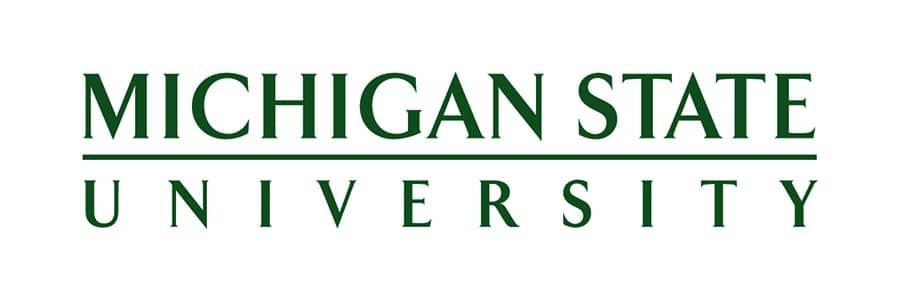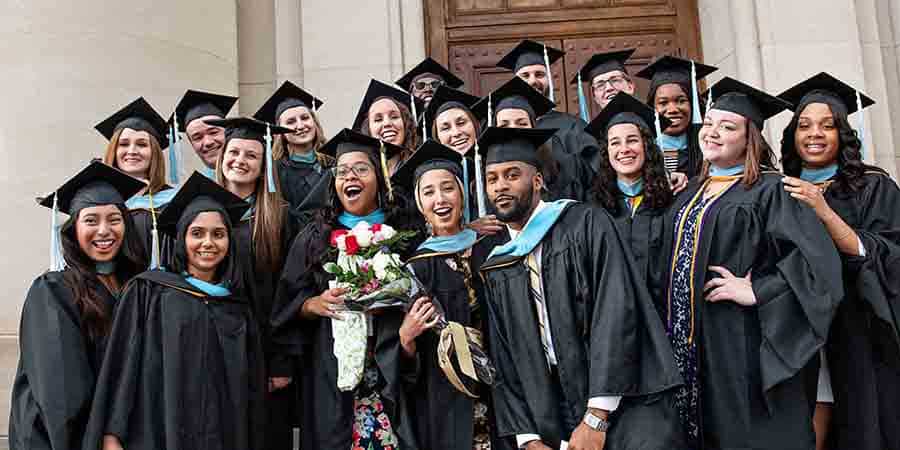For many educators, pursuing a master’s is the key to receiving a higher salary and more leadership opportunities within their district or school. We’ve gathered 20 of the best master’s programs for teachers below and outlined what applicants can expect at each.
Michigan State University

Boasting one of the best master’s programs for teachers, the Master of Arts in Teaching and Curriculum (MATC) at Michigan State University has received international recognition for its focus on improving educational opportunities for learners of all ages. Tailored for teachers who are working full-time, the program will challenge new and experienced teachers alike.
Students must complete 30 credits distributed across a professional development and inquiry core, their concentration, and electives. They must also submit a synthesis paper and professional portfolio near the end of their studies.
Michigan State’s MATC can be completed online except for the optional ESL K-12 endorsement.
School Overview
University of California Los Angeles
UCLA offers an intensive two-year Master of Education (M.Ed.) program whereby students can obtain a California teaching credential and their M.Ed. with a mathematics, science, English, elementary, or social science specialization.
UCLA offers one of the nation’s best teaching masters programs because it partners with schools in diverse, low-income areas which often do not have ready access to certified teachers. During the first year, students complete coursework, begin student teaching in a partner school and prepare for their edTPA. This end-of-year test fulfills California’s credential requirements.
Second-year students assume paid teaching positions in their partner school districts and complete a research project to fulfill their M.Ed. requirements.
School Overview
University of Wisconsin – Madison
UW-Madison’s coursework spans two summers and an intervening academic year. Students will complete university coursework while simultaneously engaging in related field work. They must also complete a master’s project to receive their degree.
Students who complete the program will earn a Master of Science in Curriculum & Instruction and be certified to teach their subject area specialization in middle and high school roles. Graduates will also be ESL-certified, qualifying them to teach English Language Learners alongside core academic subject instruction.
School Overview
Teachers College at Columbia University
The philosophy behind the program at Teachers College focuses around teaching as inquiry, curriculum making, and social justice.
Graduates will receive a master of arts degree for either elementary or secondary education, depending on the coursework they choose to complete. Secondary degrees are offered via specializations, including English, science, mathematics, and social studies. Students will also graduate with a New York State Professional Certification in their chosen grades.
Depending on when students start, the program can be completed in as little as one year or as long as 17 months. Students can also complete this coursework part-time. Initial Certification must be completed to be considered for admission.
School Overview
University of Michigan

University of Michigan’s School of Education has six of the top ten programs in U.S. News & World Report’s specialty programs rankings.
As a result, many pathways are available for students to obtain an M.Ed. or similar degree from UM. Some bestow elementary or secondary certification to graduates, while others make it possible to complete an MBA or master of arts alongside an M.Ed.
Credit requirements range from the low 30’s to near 70 (for dual-degree programs).
School Overview
Indiana University Bloomington
Indiana University has over two dozen master’s in education degrees and degree tracks for students, each with varying requirements and credit hour commitments.
Their M.S.Ed. in Elementary Education has four tracks; the Early Childhood Education track requires 36 credit hours to complete. Fifteen of those will be courses in the student’s major, with the remainder coming from foundational courses, electives, and thesis/internship work.
The M.S.Ed. in Secondary Education only has one track, which requires 36 credit hours. Most credits will come from advisor-approved focus courses, with general, foundational, and elective credits rounding out the rest. Students should expect to write a practicum for this degree as well.
School Overview
University of Illinois – Urbana Champagne
U of I is well-known within Illinois for having one of the best master’s programs for teachers: it’s a top destination for teachers looking to further their education. The school offers plenty of degree possibilities for postgraduate education study, including online and hybrid coursework for some degrees. Students should generally expect to complete most of their work in person.
Students can study early childhood education and elementary education or pursue a secondary education degree, which will require selecting an area of specialization.
Each of these degrees offers licensure after completing the program.
School Overview
Vanderbilt University
Students can expect Vanderbilt’s 31 credit-hour M.Ed. in Elementary Education program to take 13 months to complete. Graduates will receive licensure upon completing the Peabody College program.
Vanderbilt’s M.Ed. in Secondary Education requires 30 – 32 credit hours and can be completed in one or two years, depending upon student preference. Licensure is available but not automatic; it will require additional coursework and certifications.
100% of Vanderbilt’s job-seeking Elementary Education graduates and 91% of job-seeking Secondary Education graduates were employed or attending further graduate school within four months of graduation.
School Overview
University of Florida
UF’s College of Education offers many ways to approach a graduate teaching degree. For some specializations, students may pursue a 36-credit-hour M.Ed. / Ed.S. or a 30-credit-hour Master of Arts in Education (M.A.E.) that requires a thesis.
Available specializations include mathematics (Ed.S. / M.A.E.), English (Ed.S. / M.A.E.), reading and literacy (Ed.S. / M.Ed. / M.A.E.), science (Ed.S. / M.A.E.), and social studies (M.A.E.). UF offers an M.A.E. in Early Childhood during the fall semester. Certifications for specializations are earned separately from the degree itself.
Many of their courses are available online – UF was ranked #2 in online learning by U.S. News and World Report.
School Overview
SUNY Albany
SUNY offers multiple degree paths for graduate study. For teaching, students can pursue an M.S. in Early Childhood Education, Childhood Education (elementary grades), and Secondary Education (high school).
Both the Early Childhood Education and Childhood Education tracks offer great flexibility: courses can be completed online or on campus. Because of its included practice, the M.S. in Secondary Education is not available online, but graduates who complete this degree will receive certification and be ready to begin teaching immediately. The Childhood and Early Childhood tracks do not result in certification.
School Overview
University of Georgia
The University of Georgia offers multitudinous degree paths, including intriguing “Double Dawg” options that combine bachelor’s and master’s degrees. Their Master of Arts in Teaching (MAT) programs allow existing degree-holders to gain teaching certification and begin working while progressing toward their complete master’s.
Available M.Ed. paths include Elementary Education, English Education, Mathematics in PreK – 8 and grades 6 – 12, a general middle grades education track, science, and social studies. Many of their degrees are available online, as well.
School Overview
Brown University
Brown’s Master of Arts in Teaching (MAT) is an intensive one-year program that allows students to complete a residency with a partner school – giving them a chance to see everything in action at ground level while gaining context for the educational system at large. Residencies start in August, and coursework kicks off in early September.
The program culminates in May with commencement and certification from the Rhode Island Department of Education – making graduates eligible to begin teaching immediately upon graduation.
Specializations are available in secondary English, mathematics, social studies, and science.
School Overview
University of Iowa
Aspiring Hawkeyes have many education graduate degree options to choose from. Specializations include English, mathematics, social studies, and science, each available in various formats.
Applicants can choose to pursue degrees that do and do not include licensure – the University of Iowa website does an excellent job of making it clear on each page which track is which. In addition, some degrees are available online, while others are not.
There is also a general-track Early Education program; students who pursue this option must choose available endorsements as an add-on to their primary degree.
School Overview
University of Nebraska – Lincoln
The University of Nebraska offers a 30 to 36-credit hour Master of Arts in Teaching, Learning and Teacher Education that applicants can specialize to include elementary teaching across reading, social studies, science, and mathematics. Students will complete nine required course credits, 12 credits of specialization courses, and 15 credits of electives.
This coursework will not lead to certification; however, UNL also has M.A. courses leading to certification in multiple endorsement areas. Prospective students must complete a second application to be considered for this program.
School Overview
University of Pittsburgh
U.S. News and World Report consistently ranked the Pitt School of Education as one of the best teaching masters programs. Pitt offers over 50 education degree programs – nearly three dozen of which are at the graduate level. As a bonus, Pitt School of Education applicants do not need a GRE on record to be considered for admission.
For teaching-specific degrees, students can pursue an M.Ed. in Early Childhood Education or Elementary Education. These 36-hour courses can be completed full- or part-time, with most students receiving their degree within two years. PreK-4 teaching certification is also available.
Secondary Master of Arts in Teaching (MATs) are offered according to specialization, including English, science, mathematics, and social studies. Teaching certificates are available for each discipline but are not earned by completing the standard MAT coursework.
School Overview
Ball State University
Ball State University offers its Early Childhood, Elementary, and Secondary Master of Arts in Education (MAE) courses online. The Early Childhood and Elementary specializations both require 30 credit hours to complete. A Secondary Education degree will require 30 – 36 credit hours and even offers a dual credit teaching credential.
Because the program is completed online, earning a degree does not lead to initial licensure; graduates will need to pursue that separately in the state where they intend to teach. Applicants without a teaching license but with a bachelor’s in another field can consider Ball State’s Transition to Teaching programs for Elementary and Secondary education.
School Overview
Boston College
Boston College offers a traditional Masters of Arts in Teaching (M.A.T.) English experience at the secondary school level. Students work closely with faculty advisers to ensure a well-rounded learning experience that prepares them for the wide range of material they may be required to teach. The degree will require 30 credit hours.
Licensure and certification are not available through Boston College. However, the school does offer Teacher Training through fellowships and teaching assistant programs.
School Overview
University of South Carolina – Columbia
UofSC’s 100% online M.Ed. program offers four specializations: English for Speakers of Other Languages; Literacy and Reading; Multicultural Contexts in Education; and Project-Based Learning. Applicants do not need a GRE or MAT score on file for admission.
In addition to the M.Ed. program, applicants who do not have an educational background can consider an in-person Master of Arts in Teaching (MAT) in Elementary Education or Master of Teaching (M.T.) for Career Changers.
School Overview
University of Central Missouri
The University of Central Missouri offers a Master of Arts in Teaching (MAT), ideal for career changers or people who still need their initial teaching certification. Most applicants will finish the program within two years. Students complete coursework online, helping balance degree work and personal responsibilities.
Educators can pursue a fully-online Master of Science in Education for Elementary Teaching from the University of Central Missouri.
School Overview
Benefits of a Master’s in Teaching
Getting a degree from one of the best teaching masters programs is about more than a bigger salary. Teachers who return for their master’s have the opportunity to hone their classroom skills further, including tailoring learning to individual student needs. They’ll also learn about the latest learning research and bring back new techniques that can directly impact classroom performance and improve learners’ outcomes.
Obtaining an advanced degree also demonstrates dedication to the role, which can set teachers up for leadership positions within their school or district. Depending on the degree earned, teachers may be able to move into administration.
How much higher salary do teachers with master’s degrees make?
The National Council on Teacher Quality recently completed a pay study showing that many school districts offer higher salaries for pursuing an advanced degree. Some districts even provide tuition reimbursement, helping teachers realize their degree’s total “value” even more quickly.
The study revealed that a first-year teacher could potentially earn up to $6,000 more than a first-year teacher with a bachelor’s degree. It’s important to note that these figures depend heavily upon the district where the teacher is employed.
Factors to consider when selecting a teaching masters program
The most important factors for choosing a teaching master’s program depend on why and how quickly you want to earn your degree and whether you will need certification/licensure or just the degree itself.
- Accreditation: Make sure your program is nationally or at least regionally accredited. Getting a degree from an accredited institution assures potential employers that you received a quality education and can do the job they’re hiring you to do.
- The Council for the Accreditation of Educator Preparation, or CAEP, is the primary national accreditation agency for postsecondary teacher education curricula; however, other recognized accreditation agencies hold schools to the same rigorous standards.
- Cost: Many factors can influence a degree’s cost, but according to Erudera, the average price of a master’s degree in Education is about $55,000. Going to a public school costs less than $30,000 on average, making this one way to save on the price.
- Online Flexibility: An online degree program allows you to complete your coursework from anywhere with a computer and an Internet connection at your chosen time. It’s an excellent option for parents or caregivers for older relatives and those who do not live within easy commuting distance of a program.
Despite its many advantages, when it comes to earning a master’s in teaching, online learning has some drawbacks. To receive certification or licensure, you’ll often need to complete a student teaching program or some sort of residency at a school, so many students won’t be able to eschew in-person learning entirely. Many schools still offer their teaching master’s programs entirely in person, so it can be hard to find a completely web-based degree program.
How Long Does it Take to Earn a Master’s in Teaching degree?
The time commitment to complete one of the best master’s programs for teachers varies depending on whether you’re pursuing a degree in early childhood, elementary, or secondary education. Specific requirements vary from school to school, but early childhood degrees generally take less time than secondary degrees. In many cases, you should expect to spend between 10 months and two years working toward your degree. If you’re studying part-time, this could be even longer.
Sources
https://soe.umich.edu/news/u-m-ranked-among-top-education-schools-2023
https://erudera.com/statistics/us/average-cost-of-a-masters-degree/
https://www.nctq.org/blog/Upping-the-ante:-The-current-state-of-teacher-pay-in-the-nations-large-school-districts
https://www.educationdegree.com/articles/teacher-salary-with-masters-degree/


